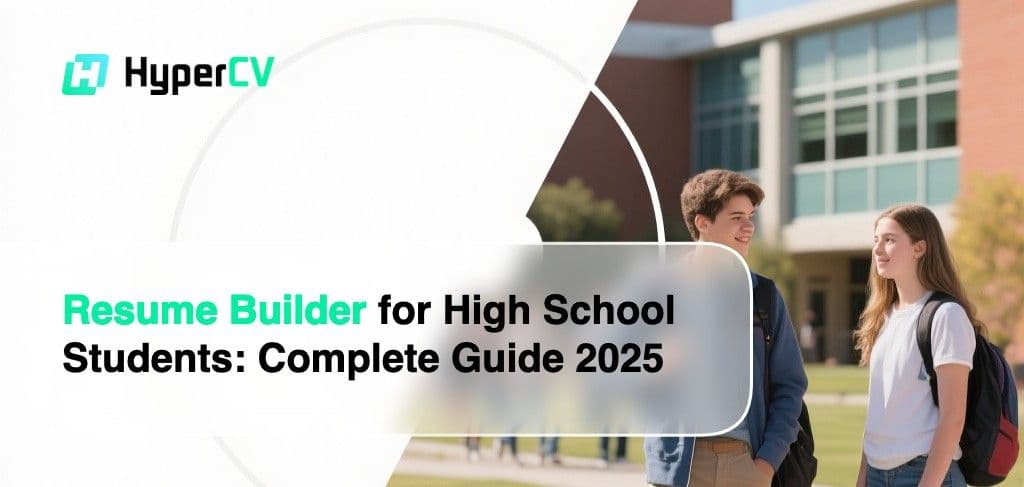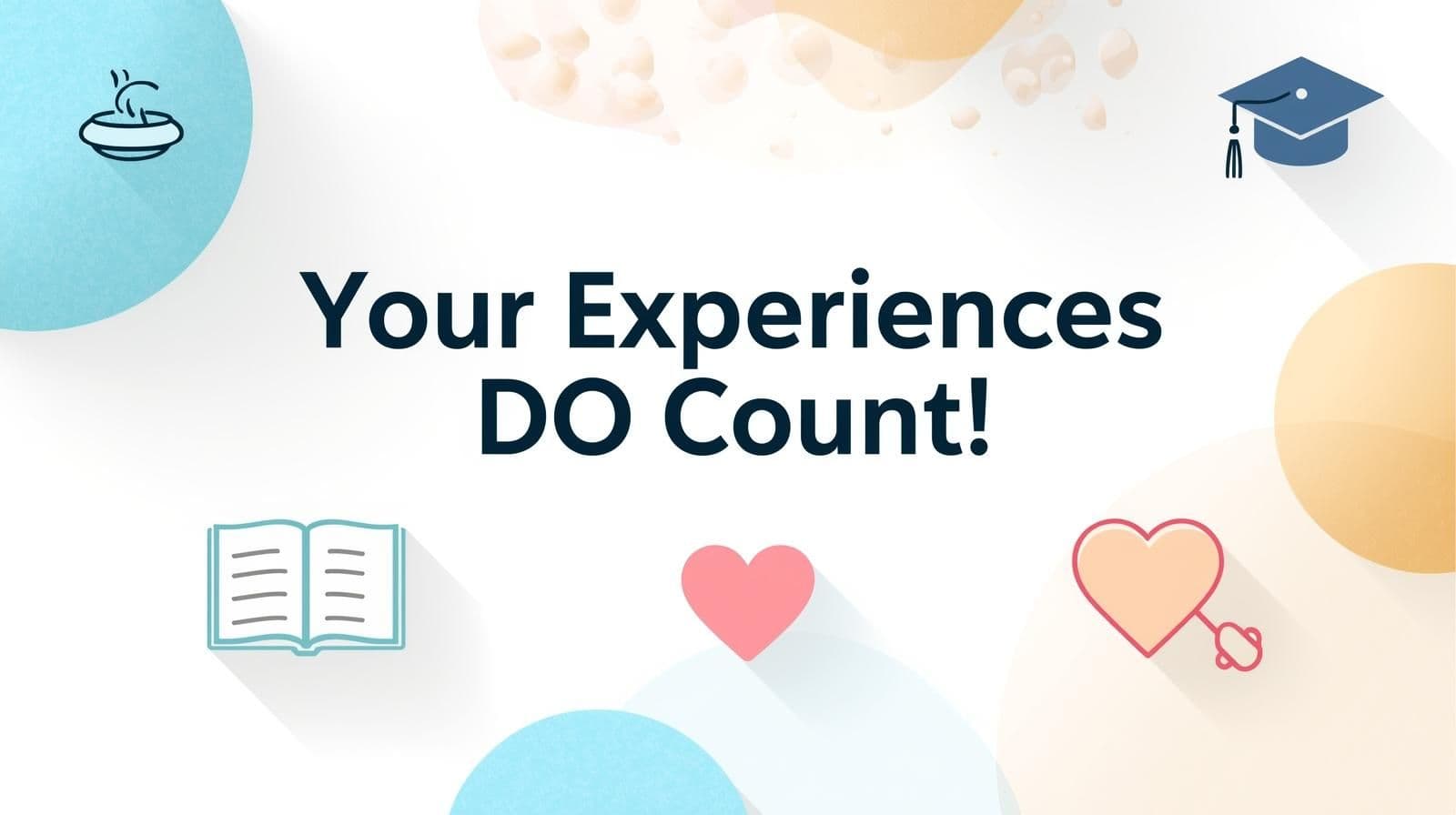Resume Builder for High School Students: Complete Guide 2025

Building your first resume as a high school student might feel scary, but it's one of the best skills you can learn. I remember helping my younger cousin create her resume for college applications - she thought she had nothing to put on it. Like many students, she believed she didn't have enough experience to fill one page. That changed completely once we found all her achievements, activities, and skills.
A resume builder for high school students is essential when you see how tough college admissions have become. Your resume shows who you are beyond test scores and grades. It tells your story through achievements, volunteer work, hobbies, and experiences that make you special.
Why High School Students Need Strong Resumes
Many students don't know that resumes have become very important in college applications. Major application platforms like Common App now ask students to submit resumes with their applications. This gives you extra space to show accomplishments that might not fit elsewhere.
According to expert guidance from resume professionals, your resume also helps in several other ways:
- Gets you ready for college interviews by organizing your thoughts
- Helps teachers write better recommendation letters
- Prepares you for job applications and internships
- Builds confidence by showing your achievements
The key difference between adult resumes and student resume examples is the focus. While adults talk about work history, students highlight education, activities, and potential.
Essential Sections for Your High School Resume
Education Background - Your Foundation
As a current student, your education section should come first on your resume. This isn't just about listing your school name. Include your GPA if it's strong (usually 3.5 or higher), important coursework, and any academic honors.
For example, instead of just writing "Lincoln High School," you might write:
Lincoln High School, Class of 2025
GPA: 3.8/4.0
Important Coursework: AP Biology, AP Literature, Statistics
Honor Roll: Fall 2023, Spring 2024
Activities and Volunteer Work - Where You Shine
This section often becomes the strongest part of a high school resume. Don't think activities that seem "normal" to you aren't important. That part-time job at the local coffee shop shows you're responsible and can work with customers. Babysitting your neighbors' kids shows you're trustworthy and can handle multiple tasks.
When describing activities, use action words and include specific details. Research from resume experts shows that quantifying accomplishments with metrics like "15% reduction in preparation time" makes resumes much stronger:
- Organized fundraising events that raised $2,000 for local animal shelter
- Led study groups for 15 classmates in AP Chemistry
- Managed inventory and customer service at family restaurant (10 hours/week)
Leadership Experience - Standing Out
Leadership doesn't always mean having an official title. Sometimes the best leadership happens informally. Maybe you started a study group, organized a community clean-up, or helped younger students. These experiences show you can take charge and motivate others.
Skills Section - Your Toolkit
The skills section lets you highlight abilities that might not be obvious from your activities. Consider including:
| Technical Skills | Language Skills | Soft Skills |
|---|---|---|
| Microsoft Office Suite | Spanish (Conversational) | Public Speaking |
| Adobe Photoshop | Mandarin (Native) | Team Leadership |
| Basic Coding (Python) | French (Beginner) | Problem Solving |
| Social Media Management | Time Management |
Practical Resume Writing Tips for Students
Keep It Short but Complete
One page is perfect for high school students. This limit forces you to choose what to include, which actually makes your resume stronger. Every line should add value to your story.
I've seen students struggle with this limit, especially those in many activities. The solution isn't to make your font tiny. Instead, combine similar experiences or focus on your best achievements.
Use Active Language That Shows Impact
Strong action words make your experiences come alive. Instead of writing "Was responsible for organizing school events," write "Organized three school-wide events serving 500+ students." The difference is huge.
As highlighted in comprehensive resume guides, here are some powerful action words for different types of experiences:
- Leadership: Directed, Coordinated, Supervised, Motivated
- Achievement: Achieved, Earned, Won, Accomplished
- Teamwork: Collaborated, Supported, Assisted, Contributed
- Problem-solving: Resolved, Improved, Streamlined, Developed
Use Numbers When Possible
Numbers grab attention and give context. "Tutored students in math" becomes much better as "Tutored 8 students in algebra, helping improve their average test scores by 15%." Even rough numbers work if you don't have exact figures.
Put Your Best Content First
Admissions officers spend little time reviewing applications. Put your strongest experiences first in each section. If you have limited space, it's better to fully develop three great experiences than to briefly mention six average ones.
Common Mistakes to Avoid
From helping many students with their resumes, I've noticed several mistakes that happen often:
Over-explaining obvious duties: Don't write "Attended meetings" under Student Council Member. Instead, focus on what you accomplished: "Proposed new recycling program adopted school-wide."
Using boring descriptions: Avoid phrases like "learned valuable skills" or "gained experience." Be specific about what you actually did and achieved.
Including irrelevant information: Your middle school achievements usually don't belong on a high school resume. Focus on recent, relevant experiences.
Forgetting to check for errors: Spelling and grammar mistakes suggest you don't pay attention to details. Read your resume out loud and ask others to review it.
Building Your Resume: A Step-by-Step Approach

Step 1: Write Down Everything
Start by listing every activity, job, volunteer experience, award, and skill you can think of. Don't edit yourself yet - just get everything on paper. Include:
- School clubs and sports
- Part-time jobs and internships
- Volunteer work and community service
- Awards and honors
- Hobbies and personal projects
- Skills and certifications
Step 2: Group and Rank
Organize your experiences into categories and rank them by importance. Think about your audience - what would impress college admissions officers most?
Step 3: Write Great Descriptions
For each experience, write 1-3 bullet points that highlight your role, responsibilities, and achievements. Use this formula: Action word + What you did + Result or impact.
Step 4: Format and Polish
Choose a clean, professional format. Make sure fonts, spacing, and formatting are consistent. Your contact information should be clear and professional - avoid email addresses like "partygirl2025@email.com."
Real Student Example
Here's how one student changed her resume. Sarah first thought she had nothing impressive to include. After our brainstorming session, we found:
- Her Saturday job at a farmers market (responsibility, customer service)
- Organizing her church's youth group activities (leadership)
- Teaching herself guitar and performing at local events (creativity, persistence)
- Keeping a 3.7 GPA while working 12 hours per week (time management)
Her final resume clearly showed her work ethic, leadership potential, and diverse interests.
Templates and Professional Resources
When looking for guidance, expert resume resources emphasize that a strong high school resume template should have a clear structure and action-oriented language. Many professionals recommend functional or combination styles for students, as these formats highlight skills and potential rather than just work history.
For students with no experience, specialized guidance suggests focusing on transferable skills from school projects, volunteer work, and extracurricular activities. These experiences often provide more valuable content than students realize.
Making Your Resume Work for You
A strong resume is just the beginning. Your resume should grow as you gain new experiences and apply to different opportunities. Keep it updated and change it slightly for different purposes - the resume you submit for college applications might emphasize different aspects than one for a summer job.
Remember, your resume represents your potential, not just your past. Admissions officers understand that high school students are still developing their interests and skills. They're looking for students who show initiative, contribute to their communities, and show growth.
The process of creating your resume is almost as valuable as the final product. It helps you think about your experiences, identify patterns in your interests, and express your strengths. These skills will help you throughout college and beyond.
Start building your resume now, even if you think you don't have enough experience. You might be surprised by how much you've already accomplished. Remember, every expert was once a beginner - your resume is just the first step in documenting your journey toward your goals.